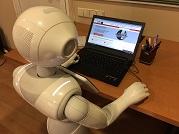|
mobby_6kl posted:I'm afraid it'll take a while until Waymo taxis can drive in Prague more than 100 meters without getting stuck or involved in some sort of incident so you'll put up with it. That’s a bit unfair when 100m is further than a human driver can get without one
|
|
|
|

|
| # ? May 9, 2024 17:26 |
|
RandomPauI posted:Waymo got the OK to operate taxis in Arizona. They expect to start a commercial, self-driving taxi service this year. I like how few pages this is from people declaring self driving cars seventy years or more away.
|
|
|
|
mobby_6kl posted:I'm afraid it'll take a while until Waymo taxis can drive in Prague more than 100 meters without getting stuck or involved in some sort of incident so you'll put up with it. Trabisnikof posted:That’s a bit unfair when 100m is further than a human driver can get without one Owlofcreamcheese posted:I like how few pages this is from people declaring self driving cars seventy years or more away. I stake my nonexistent reputation on stating that if self driving cars get declared reliable on the "good roads", they will be able to drive safely everywhere within 5 years of that. Prague is hell but surviving it takes first and foremost calm nerves and waiting things out, possibly projecting "I'm currently recording everything you're doing" neon signs in all directions if one gets stuck.
|
|
|
|
One of the memes involving Kurzweil's predictions is that you're supposed to add ten years to whatever date he gives. Turns out, that's true. Kurzweil's 2009:
To those who think he's somehow still right: well, here's the thing. Kurzweil's 2019:
Just for lulz, here's Kurzweil's 2029:
He's planning to release The Singularity is Nearer next year (IIRC), and if he does, I really hope he takes all this into account. It serves no one to keep doubling down on failed years for proven predictions. It's possible that the timeline of predictions will begin smooshing together as time goes on thanks to increased computing power and increasingly powerful and generalized AI so that his "2029" or "2039" predictions may wind up coming true on time. As a bonus, here's a gifv of Mother Jones' "Lake Michigan" analogy *** Yuli Ban fucked around with this message at 01:37 on Feb 19, 2018 |
|
|
|
Owlofcreamcheese posted:I like how few pages this is from people declaring self driving cars seventy years or more away. Someone is going to make the (completely accurate and reasonable) assertion that Arizona is pretty close to the spherical cow of the self driving world, but the fact that real, completely autonomous taxis will soon be operating commercially is kind of nuts and it doesn't really matter if they require perfect conditions. If they're at all commercially successful then there's no way they don't rapidly end up just about everywhere feasible, even if they only run seasonally or can't operate on the US east coast.
|
|
|
|
Paradoxish posted:Someone is going to make the (completely accurate and reasonable) assertion that Arizona is pretty close to the spherical cow of the self driving world Apparently Yandex taxi in russia just like yesterday posted their video of the first test on public roads in the snow of a self driving taxi. Which is probably the farthest other side of the spectrum you could get. https://www.youtube.com/watch?v=Bx08yRsR9ow
|
|
|
|
Owlofcreamcheese posted:Apparently Yandex taxi in russia just like yesterday posted their video of the first test on public roads in the snow of a self driving taxi. Which is probably the farthest other side of the spectrum you could get. The advantage of operating it in Russia is that if it gets into a crash, the local headline will probably be "loving idiot backs into a super expensive self driving taxi prototype" and it won't make it past that.
|
|
|
|
Yuli Ban posted:One of the memes involving Kurzweil's predictions is that you're supposed to add ten years to whatever date he gives. Paradoxish posted:Someone is going to make the (completely accurate and reasonable) assertion that Arizona is pretty close to the spherical cow of the self driving world, but the fact that real, completely autonomous taxis will soon be operating commercially is kind of nuts and it doesn't really matter if they require perfect conditions. If they're at all commercially successful then there's no way they don't rapidly end up just about everywhere feasible, even if they only run seasonally or can't operate on the US east coast. Owlofcreamcheese posted:Apparently Yandex taxi in russia just like yesterday posted their video of the first test on public roads in the snow of a self driving taxi. Which is probably the farthest other side of the spectrum you could get. Teal posted:The advantage of operating it in Russia is that if it gets into a crash, the local headline will probably be "loving idiot backs into a super expensive self driving taxi prototype" and it won't make it past that.
|
|
|
|
mobby_6kl posted:Self driving cars need to all come with a robot that will get out of the car and threaten the other party automatically with an axe. I'd buy one. Maybe if you install an arm on the self-driving car?
|
|
|
|
mobby_6kl posted:Self driving cars need to all come with a robot that will get out of the car and threaten the other party automatically with an axe. In Russia it must be able to bribe the police.
|
|
|
|
mobby_6kl posted:but the fact that we're just months away from loving Johnny cab is pretty mindblowing. Unless this just bombs completely, which is possible but unlikely, I certainly expect them to slowly expand it to more challenging locations. This is why it's frustrating to see people make the "ten years away!" joke when it comes to self-driving cars. If anything they've been operating on the exact opposite principle. Ten years ago they were still multiple decades from ever being commercially viable, even on a small scale. Five years ago they were still at least a decade away, if not longer. Even a year ago most people were sure that autonomous cars without safety drivers wouldn't be on the roads and taking passengers before 2020 at the earliest. Now it seems like the only argument left is that they won't be available literally everywhere by tomorrow. I get being skeptical of breathless claims about new technology, but self-driving technology has been advancing very, very quickly over the last five years.
|
|
|
|
Paradoxish posted:This is why it's frustrating to see people make the "ten years away!" joke when it comes to self-driving cars. If anything they've been operating on the exact opposite principle. Ten years ago they were still multiple decades from ever being commercially viable, even on a small scale. Five years ago they were still at least a decade away, if not longer. Even a year ago most people were sure that autonomous cars without safety drivers wouldn't be on the roads and taking passengers before 2020 at the earliest. Now it seems like the only argument left is that they won't be available literally everywhere by tomorrow. It's mostly thanks to the unexpected explosion of how Neural Networks got at first really good at distinguishing poo poo on pictures, and then fast enough to be ran real-time for "car's whole surroundings" volume on consumer grade GPU. Computer vision has been kinda flopping around "so, can we do reliable Optical Character Recognition or not?" for 60 years and then suddenly in last 15 we wen't from "we can finally find faces on camera in real time on a consumer chip rather than overnight on a cray" to, well, self driving cars. The rest of the task was kinda easy, it just relied on this and nobody knew how to do it until they did.
|
|
|
|
mobby_6kl posted:
That video was the first on open public roads in the winter. In closed road testing this is where they are at: https://www.youtube.com/watch?v=7hUut7Hsgys
|
|
|
|
tfw my yandex taxi goes full yandere
|
|
|
|
Owlofcreamcheese posted:That video was the first on open public roads in the winter. In closed road testing this is where they are at: So is it using the tracks left by other cars to navigate? What happens when the road is completely covered? Human drivers aren’t good at that, are robo drivers doing something different? Maybe using sonic sensors or something to find the road edges?
|
|
|
|
ElCondemn posted:So is it using the tracks left by other cars to navigate? What happens when the road is completely covered? Human drivers aren’t good at that, are robo drivers doing something different? Maybe using sonic sensors or something to find the road edges?
|
|
|
|
ElCondemn posted:So is it using the tracks left by other cars to navigate? What happens when the road is completely covered? Human drivers aren’t good at that, are robo drivers doing something different? Maybe using sonic sensors or something to find the road edges? I don't know the details of this specific car but most "drive in snow" stuff works by pre-mapping the area then comparing what the in snow car sees to what the in good condition cars saw so every tree and rock and building on the side of the road becomes a point to recenter the model of where you should be. Like you take the data from this video, make it into a 3D model, store it, then the car in the snow figures out where it is by constantly recentering where it might be on the model. So the sensors only need to deal with ephemeral things like not hitting passing cars and making educated guesses on where it might. https://www.youtube.com/watch?v=nXlqv_k4P8Q or actually probably more like this one: https://www.youtube.com/watch?v=xEGYZE13LB0 Owlofcreamcheese fucked around with this message at 18:52 on Feb 19, 2018 |
|
|
|
High end GPS+Glonass+Galileo combos can also get sub metre precision so if it drives slowly enough in pre-mapped areas it might as well be able to do it "blind".
|
|
|
|
Paradoxish posted:This is why it's frustrating to see people make the "ten years away!" joke when it comes to self-driving cars. If anything they've been operating on the exact opposite principle. Ten years ago they were still multiple decades from ever being commercially viable, even on a small scale. Five years ago they were still at least a decade away, if not longer. Even a year ago most people were sure that autonomous cars without safety drivers wouldn't be on the roads and taking passengers before 2020 at the earliest. Now it seems like the only argument left is that they won't be available literally everywhere by tomorrow. The problem is that obsessive fans are completely unwilling to acknowledge any sort of setback or flaw. Look at the way OOCC posts for instance. Furthermore, I'm getting tired of being told to take the cheery picked release of privately gathered data or whatever Elon Musk says as gospel rather than waiting for a government regulator to perform or otherwise certify testing. When the NHTSA or similar organizations perform extensive testing, I'll happily change my opinion. I don't think that's unreasonable.
|
|
|
|
Solkanar512 posted:Furthermore, I'm getting tired of being told to take the cheery picked release of privately gathered data or whatever Elon Musk says as gospel rather than waiting for a government regulator to perform or otherwise certify testing. When the NHTSA or similar organizations perform extensive testing, I'll happily change my opinion. I don't think that's unreasonable. It's not unreasonable and I'm usually on the skeptical side with this stuff, but the reality is that there are going to be commercial implementations of this technology on the road before 2020. It's possible that the initial rollouts will be a disaster and this is only happening because these companies are taking advantage of a weak regulatory environment, but whatever the case it is happening and it's happening now. edit- I also think that even mentioning Elon Musk here is part of the problem that I find frustrating. This isn't a technology that's being pursued by Musk and a handful of SV startups, it's something that every major player in the industry is rushing towards. Tesla is only worth mentioning because they're pushing partial implementations onto the road while other companies are preparing to drop fully autonomous vehicles with no intermediate steps at all. Paradoxish fucked around with this message at 18:57 on Feb 19, 2018 |
|
|
|
Teal posted:High end GPS+Glonass+Galileo combos can also get sub metre precision so if it drives slowly enough in pre-mapped areas it might as well be able to do it "blind". Local road authority fails to update the Google Maps api, taxi goes straight through center circle of newly-constructed roundabout at 30 mph, Dukes of Hazards it across the other side https://i.imgur.com/y8YmwGb.mp4
|
|
|
|
Yeah, but could it jump over a bus like this crash? https://www.youtube.com/watch?v=TVnff5EP3Vg *Okay, technically it only jumped up in front of the bus.
|
|
|
|
|
Devor posted:Local road authority fails to update the Google Maps api, taxi goes straight through center circle of newly-constructed roundabout at 30 mph, Dukes of Hazards it across the other side I mean, you just posted a proof it happens to people too (at least drunk?) so it's not like the baseline is a high bar
|
|
|
|
https://design.google/library/fair-not-default/ this is mostly fluff without much substance to it but I guess it's nice that google at the very least feels like it's worthwhile to have a guy think about it. Or at least that it's worthwhile to have a guy who leaves the impression that he's thinking about it.
|
|
|
|
So GA is going to build a truck only highway between Macon and Atlanta. They plan to have automated trucks on it too. https://www.npr.org/2018/03/06/591266949/georgia-transportation-officials-plan-to-build-a-1-8-billion-truck-only-highway Not said in the segment, Macon has the GPA inland rail terminal, where one can ingate for the Port of Savannah. This is a BFD. It looks like what I suggested earlier in the thread. Edit :NVM guess I posted that in another thread Bar Ran Dun fucked around with this message at 01:28 on Mar 7, 2018 |
|
|
|
BrandorKP posted:So GA is going to build a truck only highway between Macon and Atlanta. They plan to have automated trucks on it too. Uh.... why not build a railroad? You know, things that are specifically designed and extremely good at bulk transport between set locations.
|
|
|
|
Taffer posted:Uh.... why not build a railroad? You know, things that are specifically designed and extremely good at bulk transport between set locations. if the end-destinations are pretty variable it saves the bother of train-to-truck transfer at the hub no clue if this is actually a compelling enough calculation to make this a good idea or if it's just "heck yeah, trucks"
|
|
|
|
Taffer posted:Uh.... why not build a railroad? You know, things that are specifically designed and extremely good at bulk transport between set locations. They already have one between Macon and Savannah. All the warehouses are in the Atlanta suburbs. Right now they truck from Atlanta, from the loading docks on the highway to Macon (or the other direction) and then pickup intermodal rail to the marine terminal or in the other direction. A railroad can't goto all those small warehouse loading docks. Basically I think the goal here is: you have a driver get the container to this highway, then the rest is automated or handled inside an interchange terminal, then onto a ship to anywhere. This highway feeds in and out of the intermodal system. GPA has thier poo poo together too. I'm very comfortable saying I think they'll successfully pull this off. They already have a huge competitive advance with the inland gate in Macon. This will further steal TEU volume from Charleston, Nyc, and Sea / Tac.
|
|
|
|
Hedged by that motherfucker is going to crash the economy and international trade. That'll gently caress up GPA's plans for this.
|
|
|
|
https://twitter.com/_Cooper/status/973901292430090241 he knew too much
|
|
|
|
https://www.nytimes.com/2018/03/19/technology/uber-driverless-fatality.html Congratulations to Uber on causing the first known pedestrian death with a self-driving car.
|
|
|
|
Chadderbox posted:https://www.nytimes.com/2018/03/19/technology/uber-driverless-fatality.html But guys, they have thousands of miles of first party testing that's never been verified by independent third parties or government agencies, how could this possibly happen?!
|
|
|
|
Uber is such a shitfest. I knew this would happen when I saw uber selfdriving cars blasting red lights in that previous lifetime now known as 2017. This is tragic, and at the same time entirely not unexpected
|
|
|
|
Solkanar512 posted:But guys, they have thousands of miles of first party testing that's never been verified by independent third parties or government agencies, how could this possibly happen?! quote:The Uber vehicle was in autonomous mode with a human safety driver at the wheel when it struck the woman, who was crossing the street outside of a crosswalk Seems like the human driver didn't have the reaction speed to prevent it either, not sure what you expect?
|
|
|
|
I kind of hope that when they release the victim's name it's Sarah Conner.
|
|
|
|
They've tasted blood now. It's only a question of time.
|
|
|
|
ElCondemn posted:Seems like the human driver didn't have the reaction speed to prevent it either, not sure what you expect? Surely this couldn’t be a problem of expecting a human being to sit around and wait for something to happen then react with all speed. But hey, if private testing with no oversight is your cup of tea then please be my guest.
|
|
|
|
Teal posted:They've tasted blood now. Blood causes problems on the sensors though, so they'll either learn not to hit people or at least to direct the blood spatter away from the sensors.
|
|
|
|
Solkanar512 posted:Surely this couldn’t be a problem of expecting a human being to sit around and wait for something to happen then react with all speed. You don't even have any information about the situation, you're just fear mongering. Solkanar512 posted:But hey, if private testing with no oversight is your cup of tea then please be my guest. I'm not sure what you mean by no oversight, these companies have licenses with the locations they operate. If they are found unsafe their rights to operate are revoked. If your standard is to have autonomous cars be perfect it's not going to happen, it's a stupid thing to expect, at least at first. But I can guarantee you that an autonomous vehicle will do better than the vast majority of drivers on the road and I trust technology more than I do some rando on the road. baquerd posted:Blood causes problems on the sensors though, so they'll either learn not to hit people or at least to direct the blood spatter away from the sensors. A hydrophobic coating is worth its price in blood!
|
|
|
|

|
| # ? May 9, 2024 17:26 |
|
ElCondemn posted:You don't even have any information about the situation, you're just fear mongering. I mean we have the information necessary, that there was a human safety driver. We also can reasonably assume that being a glorified passenger and back up driver does not require you to pay as much attention to your surroundings as actively operating a vehicle does. You're hust mad people are saying bad words about Uber
|
|
|




















